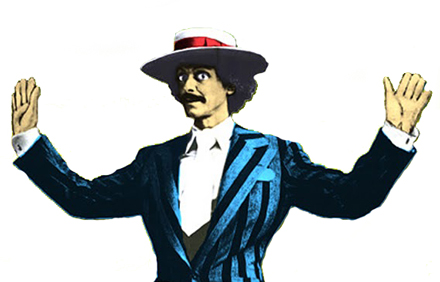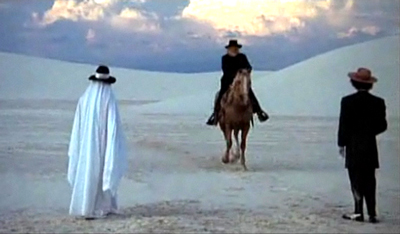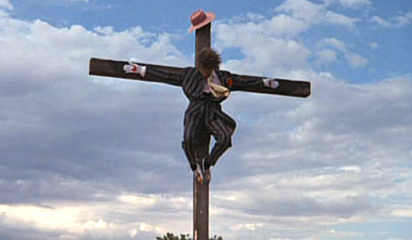
 |
|
|
|
Let's go back to the New York art scene of the 1960s. What happens to underground filmmakers? If they're lucky they make a splash, form the professional and media connections necessary to be recognized ("publicized") as artistic geniuses, and build a reputation over time. Their films may be honored with gallery or museum retrospectives, or are not seen and become legend-enhancing unknown entities. Eventually the filmmaker may take a teaching or artist-nurturing position at an art school or university film program. Robert Downey Sr., a typically independent, strong willed and completely un-housebroken filmmaker-provocateur, moved incrementally in the direction of mainstream entertainment. His crossover picture is 1969's Putney Swope, a genuinely hilarious satire of Madison Avenue. Everybody from Frank Tashlin to Mad magazine had exploited the soft target of American advertising, but Downey got it exactly right. In his wild and frequently crude pastiche, a "token" black executive is elected chairman of a large agency, and proceeds to turn it into a stronghold of Black Power, shaking down advertisers for big $ bucks. 
Putney Swope earned Downey Sr. the crown of counterculture auteur; around 1970 it seemed that every magazine editor looking for a hipster image was obliged to give him a swooningly reverent write-up. His movie Pound is a goofball allegory where humans play stray animals caged at Animal Contol. Reviewers saw the show as more evidence of a master at work transforming Theater of the Absurd into cinematic terms. The peak of Robert Downey Jr.'s filmmaking adventures came with his next picture, Greaser's Palace. Properly bankrolled by a sponsor-producer and filmed on location in Camel Rock, New Mexico, this irreverent allegory hit just as the critics at mainstream venues like Newsweek needed to prove their hipness by championing directors Outside the Box. Given an adequate budget, Downey presents a generic western setting complete with a crusty land baron and a large cast of desert-dog eccentrics with absurd names: Coo Coo, Cholera, Spitunia, Gip and Lamy Homo. Everything in this strange little town is owned by Seaweedhead Greaser (Albert Henderson), an eternally constipated patriarch who spends his time collecting tribute, shooting people that bother him and enjoying his daughter Cholera's strip performances in The Palace, the saloon-Mecca of the territory. Greaser shoots his own son Lamy Homo (Michael Sullivan) just out of meanness. Parachuting (?) into this predicament is Jesse (Allan Arbus), a zoot-suited stranger in a strange land who proceeds to heal the sick and raise the dead (starting with Lamy, several times, actually). He cures the local Indian leader, Chief Cloud in the Head (Pablo Ferro), of a back injury. Although a small contingent begins to worship Jesse, the locals are mostly unimpressed, even when he walks on water. Jesse is distraught to see the evil around him; all he wants to do is be a success on the stage in Jerusalem. The "Ghost" (Ronald Nealy, wearing a sheet, a hat and smoking a cigar) has already given up on the town, and The Father (Woody Chambliss) stays aloof to evil of mankind. The Palace crowd has no reaction to Jesse's song & dance boogie-woogie act, but wildly approve of his follow-up stunt, making bloody stigmata appear in the palms of his hands. To Cholera's chagrin, Seaweedhead wants to sign Jesse up immediately. Jesse wants to first confer with his agent, a strange galoot who walks the wasteland with a glass bubble over his head (Don Calfa). 
Absurd doesn't equate with "Ball 'o Laughs", and Greaser's Palace is one of those movies that either tickles viewers or puts them off: Brewster McCloud, Savages. It has the form of a comedy, yet all the actors play it entirely straight. In a script where nobody even says Hell or Damn, characters will suddenly blurt out completely unexpected obscenities. Downey plays around with a couple of Peckinpah-esque bullet hits, but most of his violence is cartoonish. Undermining the main story -- if you indeed engage with the main story -- is a sidebar narrative about a pioneer woman (Elsie Downey) who wakes up at a campsite to find her husband and little son (Robert Downey Jr.!) with their throats slit. Like a perverse running gag, Downey drops in from time to time to see her continue to suffer additional gunshot and arrow wounds. This part of the story is deeply affecting -- we really want Jesse to wander in and cure her as well. In his striped suit with the "reet pleat and the drape shape", the amiable Jesse has only to touch a corpse or cripple and utter the words "If you feel, you heal", to make them spring to health. All except for one cripple, who seems content to be able to amble on his knees and elbows: "I can crawl again!" We soon realize that Cholera is Mary Magdalene, the Al Capp- like Ghost is "The Holy Ghost" and the bearded stranger called Father is God. Not much is made of the tragedy of man's indifference to miracles and Jesse's message to be nicer to each other. The heavy-duty allegory along those lines is of course Buñuel's Simon of the Desert, where a prophet's miracles are wasted upon a worthless humanity. But Greaser's Palace is far more honorable than 1001 pretentious "Christ parables" that pretend they have important messages to deliver. Downey is clearly into his muted jokes. The entire town, including a mariachi band, hangs in suspense every time the big boss makes another failed trip to the outhouse. The jokes are crude but never really ugly, like having a nun played by a homely man. Jesse is "tempted" by a perverse midget (Hervé Villechaize) who lives in a shack with a man who dresses up as a woman and goes by the name of Mrs. Spitunia (Stanley Gottlieb). The crazy relationships are the joke, as there's little verbal wit. When referring to his father, Jesse calls him "Bingo Gas Station Motel Cheeseburger With A Side Of Aircraft Noise And You'll Be Gary Indiana". Repeatedly. This isn't Texas, and it isn't The Twilight Zone. You've just crossed over into the territory known as the Theater of the Absurd. 
Allan Arbus plays Jesse with a funny walk and a hopeful attitude. His wife Diane Arbus, the famous photographer, had just committed suicide and Downey had to help the actor get through his role. Both Luana Anders and Toni Basil (as a wide-eyed and topless Indian girl) come from the circle of folk around Roger Corman, A.I.P. and BBS; they both had parts in Easy Rider. Pablo Ferro, is indeed the legendary designer who revolutionized main titles (and movie trailers) with his first effort, Dr. Strangelove. Most everybody else is a Downey regular or a colorful face found in Santa Fe to dress up the crowd scenes. As a director Downey doesn't have any particular affinity for the western genre. His visuals are on the haphazard side, which for this film may be appropriate. Never quite big enough to become a cult film or a midnite screening favorite, Greaser's Palace remains an engaging slice of independent underground/above ground absurdity. Scorpion Releasing's DVD of Greaser's Palace is a good enhanced encoding; the film hasn't looked this good since it was new. Jack Nitzche's spare soundtrack comes across well, although viewers are more likely to remember Jesse's spirited boogie-woogie performance. Although it may say more about the state of reviewing in 1972-73 than anything else, Robert Downey's film landed on several of the year's 'best of' lists. Scorpion includes a welcome extra, an interview with the still hale 'n' hearty Robert Downey Sr., conducted by writer Rudy Wurlitzer. Downey goes into all facets of the show, including raising the money and filming way out west, and includes some amusing anecdotes from the set. Jonathan Demme contributes an enthusiastic liner note testimonial to the film and its one-of-a-kind director.
On a scale of Excellent, Good, Fair, and Poor,
Greaser's Palace rates:
Reviews on the Savant main site have additional credits information and are often updated and annotated with reader input and graphics. Also, don't forget the 2010 Savant Wish List. T'was Ever Thus.
Review Staff | About DVD Talk | Newsletter Subscribe | Join DVD Talk Forum |
| ||||||||||||||||||